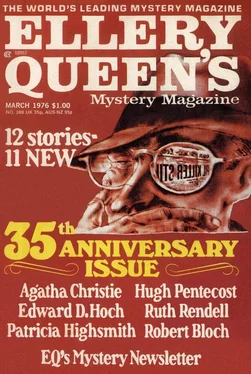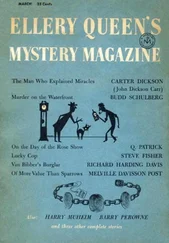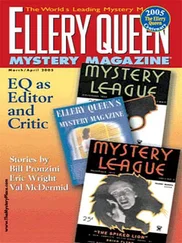Аврам Дэвидсон - Ellery Queen’s Mystery Magazine. Vol. 67, No. 3. Whole No. 388, March 1976
Здесь есть возможность читать онлайн «Аврам Дэвидсон - Ellery Queen’s Mystery Magazine. Vol. 67, No. 3. Whole No. 388, March 1976» весь текст электронной книги совершенно бесплатно (целиком полную версию без сокращений). В некоторых случаях можно слушать аудио, скачать через торрент в формате fb2 и присутствует краткое содержание. Город: New York, Год выпуска: 1976, Издательство: Davis Publications, Жанр: Детектив, на английском языке. Описание произведения, (предисловие) а так же отзывы посетителей доступны на портале библиотеки ЛибКат.
- Название:Ellery Queen’s Mystery Magazine. Vol. 67, No. 3. Whole No. 388, March 1976
- Автор:
- Издательство:Davis Publications
- Жанр:
- Год:1976
- Город:New York
- ISBN:нет данных
- Рейтинг книги:5 / 5. Голосов: 1
-
Избранное:Добавить в избранное
- Отзывы:
-
Ваша оценка:
- 100
- 1
- 2
- 3
- 4
- 5
Ellery Queen’s Mystery Magazine. Vol. 67, No. 3. Whole No. 388, March 1976: краткое содержание, описание и аннотация
Предлагаем к чтению аннотацию, описание, краткое содержание или предисловие (зависит от того, что написал сам автор книги «Ellery Queen’s Mystery Magazine. Vol. 67, No. 3. Whole No. 388, March 1976»). Если вы не нашли необходимую информацию о книге — напишите в комментариях, мы постараемся отыскать её.
Ellery Queen’s Mystery Magazine. Vol. 67, No. 3. Whole No. 388, March 1976 — читать онлайн бесплатно полную книгу (весь текст) целиком
Ниже представлен текст книги, разбитый по страницам. Система сохранения места последней прочитанной страницы, позволяет с удобством читать онлайн бесплатно книгу «Ellery Queen’s Mystery Magazine. Vol. 67, No. 3. Whole No. 388, March 1976», без необходимости каждый раз заново искать на чём Вы остановились. Поставьте закладку, и сможете в любой момент перейти на страницу, на которой закончили чтение.
Интервал:
Закладка:
“Well, mostly how well I was doing. I guess he liked my looks.”
“Okay, when did Kraft tell you he had something interesting to tell you?”
“Right after I got back from lunch.”
“That was before the murder. Can you think of any reason he would want you to come out to his place in Brooklyn?”
“To give me this information? I don’t know, Chick,” she said, giving me that baby-face pout.
“Remind me to give you a lecture on taking candy and rides from strangers. But let’s say he had good news for you, like you were going to be very important in the new format, and he decides to make a little hay with the news.
“But when Powers takes the long count, and Kraft has the carbon to the script that spells out who is going to get the ax on the show, he tries a blackmail scheme on that person and gets it in the back. Now, both the original and the carbon copy are destroyed, so it’s eenie-meenie-miney-mo, and Jeepers gets tapped because she follows up on the invitation that Kraft probably forgot.
“So far, folks, we haven’t solved anything, because we don’t know what Powers wrote. But we will.”
That grabbed them, even Jaffee.
“Kelly, if you’ve been withholding evidence, so help me—”
“You have the evidence, Jaffee, not me. Roll it in, Ted.”
Summers wheels in Powers’ typewriter and its stand. I held my breath and gave it a quick look. Was my memory right? It is, because Powers’ machine is the same model as Mrs. Mangerton’s new one.
“How many old flicks have you seen where a typewriter gave a killer away? A broken letter or a letter out of alignment — stuff like that. Now, I have a little old lady who works in my office, and she’s always complaining about modern things. But there is something to be said for advanced technology after all. On an old-style model the ribbon keeps reversing itself and works until the ink is too light. Just a few hours ago I had a conversation with a courteous typewriter dealer who confirmed something. This electric model, in its mania for conspicuous consumption, has the tape going through the machine only once. I know, because I get bills for changing my ribbon every month. In fact, it isn’t even a ribbon; it’s a strip of carbonized tape, and it records everything typed on it. Case closed, Jaffee.”
Sure I sweated bullets of five different calibers while the police technicians unloaded the ribbon and read it like a ticker tape. Whether the cops could make it stick with Ginny Owens was debatable, but for the moment she was bankrupt in the freedom department. It seems old Walt finally paid her off. In the new format she was destined to be killed on the show, and her death would serve as a bridge to a medical locale.
Ginny did not like being a bridge to her own oblivion. She was shaky enough when Jaffee’s boys led her out, so he might get a confession out of her. At least Bullethead had a working motive more solid than the gossamer stuff he had tried on Jeepers.
“You know, it could have been me, Chick darling,” the Jeep coos later at my pad.
I didn’t answer her, the same way I didn’t answer Steve Kozak. Barry Kantrowitz always says that “Life is like the Queen of Sheba. She comes to test you with hard questions.”
But I’m a comic, not a philosopher, so I mixed her another mimosa and tossed her a gag line. Somehow it’s okay if you always keep ’em laughing, folks.
The Jury Box
by John Dickson Carr
This month, for the first time in our own poker game, I have been dealt four of a kind, all big ones. Let’s get it straight. Though very different in mood, pace, background, and technique, all four books under discussion have at least two features in common. Each tells a gripping human story which will hold you to the end. And each (mirabile dictu!) is a true detective novel, with formidable problem solved by deduction from visible clues or by police routine intelligently directed.
You may prefer one approach; you may prefer another. That’s a matter of taste, which must always be left open. These four items have been ranked according to the order in which your mentor most enjoyed them, it being understood that I enjoyed and approved them all.
Loren Mensing, still-young professor of jurisprudence in Publish and Perish , by Francis M. Nevins, Jr. (Putnam, $6.95), engages our sympathy as he tries his wits on an exciting murder mystery in the classic style of Trent’s Last Case or Calamity Town.
As a working lawyer before his academic employment, Loren has drawn mutual wills for Graham Dillaway and Dillaway’s new wife, Hope Foxworth, both successful novelists of erratic personality.
It’s a deadly business. When Dillaway dies in that mountain-hut fire, together with some man of dubious antecedents, Loren is hired to unravel the tangle. Though he finds a girl he believed he had lost, the deadly business grows even deadlier until somebody’s grimace in an elevator provides the last link.
Don’t think you have solved everything until it’s all over; Mr. Nevins, a newcomer already master of his craft, has set traps for the overconfident as well as the unwary. This very sophisticated performance, told with absolute fair play and much charm of style, offers the most attractive mystery in months.
Despite its exotic setting and atmosphere, John Wyllie’s The Butterfly Flood (Doubleday, $5.95) follows the same fair-play pattern.
In the emerging West African republic of Akhana, still haunted by ancient beliefs, our attention centers on big Dr. Quarshie, wise, tolerant, highly cultured African physician who serves as healer, national conscience, and, when necessary, detective.
When the headless body of an unknown white man is found on a sacred rock beside the river, it may be tribal ceremony or some less formal cause. Colorful characters, white mingling with the black, whirl in their danse macabre against a background vividly described by one who knows it well.
The tempo increases on every page. How our stout-hearted Dr. Quarshie takes up a murderer’s trail, from the first revealing clue to the last pursuit and its climax among the crocodiles, are notable features of another attractive mystery worth your attention.
As we join the cutthroat turmoil of The Wilful Lady, by R. G. Jeffreys (Walker, $6.95), we are whisked back through time to the boisterous England of the year 1802, during one brief interlude of peace with Napoleon.
A beautiful red-haired girl escapes from captivity on shipboard in the Thames off Wapping, not long before Lieutenant Robert Kemble, Royal Navy retired, is stabbed in his frowsy lodging nearby. Once more we investigate with Jeremy Sturrock, swaggering Bow Street Runner as formidable to wrongdoers as he is irresistible to women.
Red-haired Lydia, wilful American heiress, has become enmeshed in plots against her life, her fortune, her good name. Aided by Dr. Ian McGrath, the young Scot who loves Lydia, Sturrock plunges in to foil the plotters. If much of the speech seems cruder than need be, if formal police tactics did not yet exist, this pre-Scotland Yard sleuth unmasks several villains for the spectacular and satisfactory end.
Though murder victims dating back thirty years are unearthed from one grave in Richard Forrest’s A Child’s Garden of Death (Bobbs-Merrill, $7.95), this ancient crime has immediate and grim application to the present day.
Investigating three buried corpses, Rocco Herbert, police chief in rural Connecticut, enlists the help of his old friend Lyon Wentworth. Wentworth, picturesque author whose hobby is ballooning and his wife a state senator, has the right gift. With both amateur and professional using police resources to supplement their wits, they uncover plots updated as well as backdated, and trap their quarry in this admirable exercise of narrative skill.
Читать дальшеИнтервал:
Закладка:
Похожие книги на «Ellery Queen’s Mystery Magazine. Vol. 67, No. 3. Whole No. 388, March 1976»
Представляем Вашему вниманию похожие книги на «Ellery Queen’s Mystery Magazine. Vol. 67, No. 3. Whole No. 388, March 1976» списком для выбора. Мы отобрали схожую по названию и смыслу литературу в надежде предоставить читателям больше вариантов отыскать новые, интересные, ещё непрочитанные произведения.
Обсуждение, отзывы о книге «Ellery Queen’s Mystery Magazine. Vol. 67, No. 3. Whole No. 388, March 1976» и просто собственные мнения читателей. Оставьте ваши комментарии, напишите, что Вы думаете о произведении, его смысле или главных героях. Укажите что конкретно понравилось, а что нет, и почему Вы так считаете.












